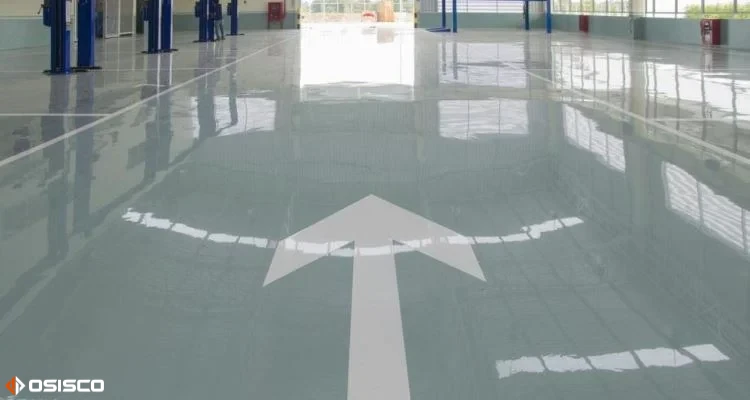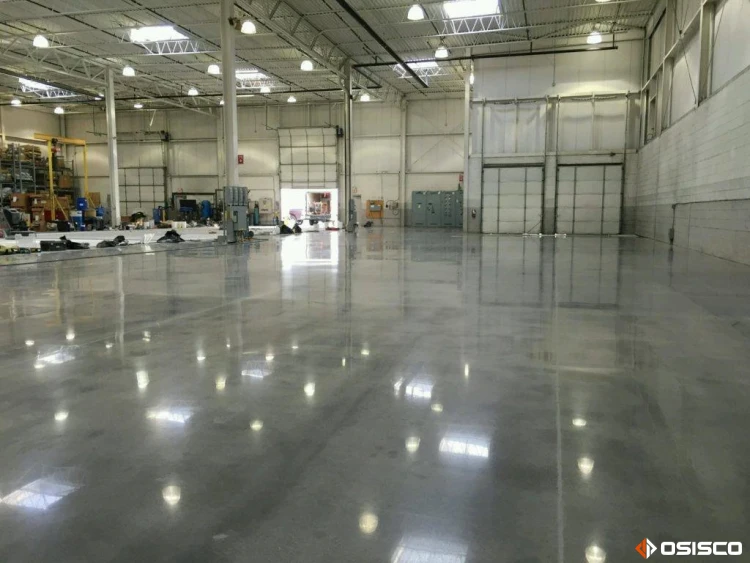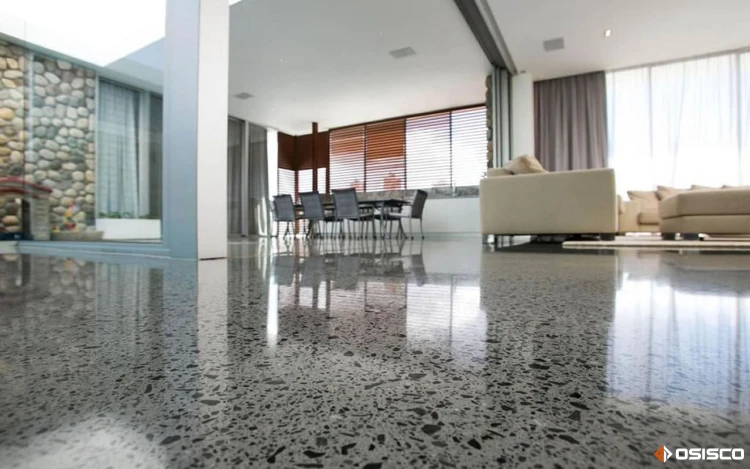Concrete floors are a common option in many factories. Concrete floors are usually installed in the form of flat slabs, with iron mesh or reinforcement embedded inside them to enhance their strength and ability to bear heavy weights.
Thanks to this network, the concrete floor is able to bear large loads, making it ideal for use in environments with heavy requirements. The most prominent advantages of concrete floors are their resistance to fire and their long lifespan.
In this article, we will detail the steps for installing and designing concrete floors for factories, in addition to the basic instructions needed to properly prepare the site. We will also explain how Osisco can help you choose the most appropriate solution for you and ensure that the work is carried out professionally.
Concrete floor treatment
Concrete is one of the common flooring materials in use, like granite and marble, as it is used on many surfaces, including areas that see heavy traffic or difficult tasks.
To maintain its bright and clean appearance, regular cleaning is necessary. Although concrete is a strong and reliable material, it may be affected by dirt, corrosion and scratches over time.
There is no need to worry, thanks to the services provided by Osisco, you can restore the appearance of factory concrete floors as if they were new thanks to professional technicians and the use of high-quality products. We provide you with an ideal surface finish. These services not only improve the appearance, but also enhance the internal strength of the concrete, which It ensures long-lasting durability and long-lasting beauty.
An important advantage of this service is that no harmful substances that affect the concrete or the environment are used during the polishing process, making it a safe and effective choice for keeping concrete floors in their best condition.
Slip-resistant floors for factories

There are many types of epoxy that can be used as concrete floors for factories, and each type has unique properties and advantages. Here are some of the most popular types of epoxy for factories:
- Epoxy floor paints
- Epoxy floor paints are one of the most popular systems in the Egyptian market, due to their ease of implementation and economical cost compared to other types of epoxy.
- This type is mainly used on the floors of food and industrial factories that require light movements and weights, as well as in offices and administrative buildings.
- Epoxy floor paints provide a glossy finish that is easy to clean, as well as resisting staining and fading.
- Solid epoxy flooring
- Solid epoxy floors are considered one of the most commonly used types of concrete floors for factories, as they consist of a single layer of epoxy and are an ideal choice for creating durable, long-lasting, and attractive floors.
- Available in multiple colors and can be applied to concrete, wood or metal surfaces, hardwood epoxy floors are usually two-part systems: a base layer that provides a smooth surface, and a top layer that adheres to it. These floors are heavy-duty, resistant to most chemicals, oils and grease.
- Epoxy mortar flooring
- Epoxy floor mortar is considered one of the types that can most withstand heavy pressures and high weights. The thickness of this type ranges from 3 to 5 cm and is mainly used for treating concrete surfaces.
- This type consists of multiple layers of epoxy placed over a concrete substrate, allowing it to withstand heavy traffic.
- Epoxy terrazzo flooring
- Epoxy terrazzo flooring is one of the best industrial flooring systems used as concrete floors for factories, thanks to its high resistance to abrasion and friction, as well as its ability to prevent slipping.
- These floors consist of a concrete base covered with an epoxy layer on top, making them ideal for use in high traffic areas such as airports, hospitals, factories, hotels and restaurants.
- Metallic epoxy flooring
- Metallic epoxy floors are one of the latest types of epoxy and are considered an excellent alternative to ceramic and porcelain floors.
- It is characterized by its ease of implementation and high hardness, which makes it ideal for commercial places such as restaurants, cafes and administrative buildings. Osisco is considered one of the first companies to implement this type of flooring in Egypt.
Read more about: Injecting Polyurethane Foam
Wear-resistant flooring for factories
Epoxy is one of the basic materials that cannot be dispensed with in concrete floors for factories, thanks to its versatility and many benefits. It plays an important role in enhancing the quality and safety of work in various industrial environments, and it is difficult to ignore its importance in several aspects, such as:
- Epoxy is a vital element in factory production processes, as it improves the strength of bonds between materials.
- Without it, structures would be less rigid and safe, increasing risks to the safety of workers and equipment.
- Epoxy contributes to ensuring the manufacture of strong and long-lasting products.
- By using epoxy, factories can produce products that can withstand wear and tear for long periods.
- Epoxy helps significantly reduce production costs by improving the efficiency of industrial processes.
- By applying epoxy, a safer working environment can be created, as it provides additional protection against accidents.
- Epoxy is an environmentally friendly material that contributes to reducing industrial waste and pollution.
Epoxy has many uses inside factories, from concrete factory floors to walls and ceilings, making it a vital component.
In addition, epoxy is an essential element in protecting against environmental hazards such as chemical spills and leaks, as it works to prevent damage from spreading within the factory.
acid stained concrete floors

Acid-resistant flooring for factories is considered an essential option for factories that deal with chemicals, especially acids and corrosive materials.
These floors provide effective surface protection and help maintain a safe and stable work environment. Here are some types and benefits of acid-resistant flooring:
- Acid resistant epoxy flooring
- Epoxy floors are one of the most popular options for concrete floors for factories that are exposed to acids and chemicals.
- These floors are highly resistant to wear and tear, as well as their ability to withstand strong acids and solvents.
- Epoxy provides a flat surface that is easy to maintain and clean, enhancing the life of the floor and reducing the risk of industrial accidents.
- Epoxy mortar floors
- Epoxy mortar floors consist of multiple layers of epoxy, and are characterized by their ability to resist corrosion resulting from exposure to acids and chemicals.
- These floors are used as concrete floors for factories that deal with strong acids such as organic and inorganic acids, as they provide superior protection against damage resulting from chemical reactions.
- Hardened polymer flooring
- Hardened polymer floors are an excellent choice for factories exposed to harsh industrial environments. These floors are designed to be particularly resistant to acids and alkalis.
- It is resistant to heat and corrosion, making it ideal for use in chemical plants and industries that require protection from corrosive liquids.
- Acid resistant terrazzo flooring
- Terrazzo flooring is also ideal for concrete flooring for factories that require acid-resistant flooring. It consists of a mixture of concrete and resins with mineral components, and provides exceptional resistance to acids and corrosion.
- This type of flooring is used in industrial facilities that need a durable surface capable of withstanding strong chemicals.
Read also about: Column Crack Repair
Concrete floors
Concrete floors are known by several names, such as printed concrete floors for factories or colored concrete. These floors are manufactured from cement, where a mixture of cement, sand, and gravel is used, with the addition of selected colors, to form various patterns and shapes resembling tiles, stone, wood, and other geometric designs.
Concrete floors are characterized by a variety of shapes and colors to suit different tastes, making them an ideal choice for decorating the external entrances of villas and palaces.
It is also used in commercial buildings, and is an excellent choice for pet owners thanks to its ability to withstand scratches and constant movement.
Epoxy for floors

When you think of polished factory concrete floors, an industrial or cold look may come to mind, but these floors can also have a shiny, colorful look.
Many people, especially those who are planning various projects, turn to concrete floors due to the many benefits they offer. These floors have become popular in homes nowadays, thanks to the following advantages:
- Durability of concrete floors
- Polished concrete floors are mostly used in commercial development, and are preferred for their beauty and durability.
- Once installed in a home, they do not need to be repaired for several years, making them a long-lasting choice that reduces the need for flooring replacement.
- Easy care
- When choosing materials for construction, many people prefer to choose materials that are easy to maintain. Concrete floors only require periodic wiping with soap and water. When installing concrete floor tiles, it is preferable to install a decorative plate to ensure easy cleaning of the floor.
- Economical cost
- Concrete floors for factories are an economical choice compared to other options such as tiles or additives over concrete. Concrete floors can be installed and designed at a reasonable cost, making them a good choice for construction.
Advantages of epoxy
Epoxy is a versatile material with many advantages that make it an ideal choice in many applications, both in industries and in interior finishes. Here are the most important features of epoxy:
- High endurance
- Epoxy is very strong and can withstand harsh conditions such as heavy weights and mechanical shocks. Therefore, it is an ideal choice for places subject to heavy traffic or strong impacts.
- Corrosion resistance
- Epoxy provides effective protection against corrosion and damage caused by chemicals, acidic and alkaline substances. This makes it suitable for concrete floors for factories and facilities that handle hazardous chemicals.
- Ease of maintenance
- Epoxy is easy to clean and maintain Thanks to its smooth surface, dirt and stains can be easily removed with soap and water, making it ideal for places that require a clean environment such as hospitals or food factories.
- Long durability
- Epoxy is known for its durability and longevity and once applied, it can last for years without the need for replacement or regular maintenance, reducing costs in the long run.
- Diverse application
- Epoxy can be used in many applications, such as flooring, walls, industrial coatings, etc. It can also be applied to many surfaces such as concrete, metal, and wood.
- Aesthetic appearance
- Epoxy is available in a wide range of colors and patterns, allowing attractive designs to be achieved. Glossy or matte finishes can also be added, enhancing the aesthetic of spaces.
- Water and moisture resistant
- Epoxy does not absorb water, making it resistant to moisture damage. This makes it an excellent choice in damp areas such as bathrooms or kitchens.
- Adhesion strength
- Epoxy has a high ability to adhere to many materials, such as concrete factory floors and metals, which enhances the strength of the structural structure of floors and walls.
- Flexibility in use
- Other materials such as fillers or pigments can be added to epoxy to modify its properties such as enhancing its heat resistance or improving its aesthetic appearance.
These features make epoxy an ideal material for use in many fields, from industrial flooring to factory coatings.
Epoxy flooring price
Although concrete floors for factories are characterized by their relatively low cost, there are multiple factors that affect the final cost, including geographical location, the size of the area to be covered, and the complexity of the chosen design.
Factors affecting the cost of polished concrete floors:
- Geographic Location: Labor and material costs vary from one region to another, resulting in polished concrete floor prices varying by location.
- Room Size: The more square feet of room to cover, the higher the total cost of installing polished concrete floors, since the project requires more materials and time.
- Design complexity: The cost of designs varies depending on their degree of complexity. Simple designs, such as one layer of dye, are less expensive, while more complex designs that include multiple colors or custom patterns are more expensive.
If you are looking for high-quality concrete floors for factories, Osisco offers you this service with the highest level of professionalism and we guarantee you the best materials and the most skilled specialized work team to meet your needs. Do not hesitate to contact us now to get the best solutions for your factory flooring.
You can know more about Concrete Floors Solutions from this link
